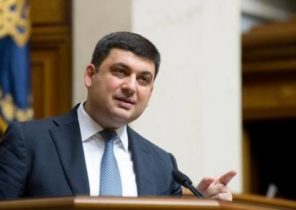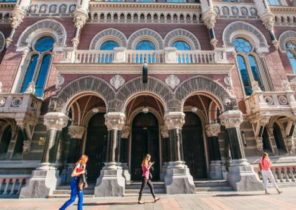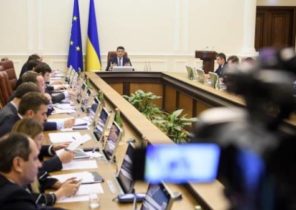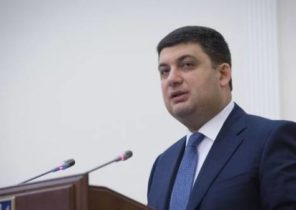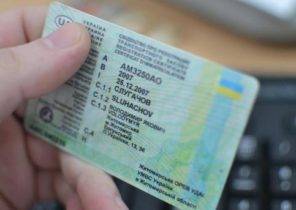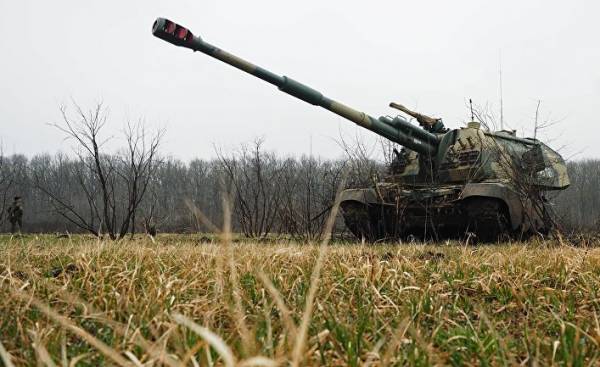
Haló novinу: At a recent conference, which took place in Prague and was dedicated to the European Union’s relations with Russia, you have quoted Russian writer of the XIX century, Tyutchev: “Mind Russia not to understand”. So is it possible to understand Russia?
Mr Prophet: the Main problem of EU-Russia relations is that Russia is different from the rest of Europe. Is a Eurasian power, the largest country in the world with the specific historical experience and specific values. Quoted Tyutchev summarize not only the perception of Europeans of the time, but the feeling of some Russians. Yet modern political science, I think, is able to characterize the political culture of Russia and thus turn Russia into a predictable partner. So the question remains about why someone talks about the unpredictability of Russia. Either they don’t know anything about science, or they deliberately manipulate public opinion.
— What, in your opinion, the features of Russian political culture?
— In the Russian political culture was influenced by its historical experience associated with the maintenance of the state, the Orthodox religious tradition and the natural and economic environment. Russia, like some other large States, is multi-ethnic and multi-religious country, but it is dominated by Russian people and Orthodoxy. Religious of Orthodox tradition, which today is cultivated in Russia as Orthodoxy is inseparably connected with the Russian state, in some cases can be a source of controversy. Either due to the fact that Western Europe, including the Czech Republic, became atheistic, or due to the fact that Europe adheres to Catholicism and Protestantism. That is, she was different.
— You are talking about the specific historical experience of Russia. The fact that the Russian passed through the ordeal, struggling with the uninvited guests, it seems to me a matter of principle. I mean Napoleon, and above all, Hitler’s Germany. The enemies have been defeated, but at the cost of unimaginable sacrifices, human and material.
— These events are only a confirmation of the Russian historical experience. The Russian state, the passing of traditions in the IX – X century, formed in the struggle with external enemies in the process of gradual consolidation of the Russian elites and the creation of a strong Central government. Her absence was always threatened by the collapse of the state and loss of national and religious, that is Orthodox, identity. We can remember the Mongol invasion in the XIII century, armed conflict with Lithuania, Poland, Sweden and Turkey in the next century. Probably the most in the Russian subconscious crashed into the so-called time of Troubles (time of Troubles 1598 — 1613), when the Moscow Kremlin was captured by the poles and Russia was threatened with the loss of independence. XIX and XX century, thus became merely a repetition of the experience of previous centuries. The quintessence of this experience are the famous words of Alexander III that Russia has only two allies: the army and Navy. The gradual consolidation of the Russian elite and establishment of a centre of power contributed to victories and territorial expansion. The Russians called it the gathering of lands or surrounded by core layers (like onions).
— How would you describe the formation of the Soviet Union? It is also surrounded by layers?
— After 1917 to the Bolsheviks moved the Royal officers, as they believed that only the Bolsheviks were capable of preventing the disintegration of Russia. The subsequent expansion of spheres of influence of the Soviet Union was the result of rivalry between capitalism and communism, and in this struggle the West has not always been fair. The national liberation movement, which enjoyed the support of the Soviet Union, was a response to the colonialism of the West. The Munich agreement signed by France and great Britain, undoubtedly, has strengthened the prestige of the Soviet Union in the eyes of our society. In the extension of spheres of influence of the USSR could be the element of traditional Russian messianism.
— Today, the newly independent Baltic countries call their joining the USSR in 1940, the occupation. This approach has become the official state position and the reason for written search “fleas” in relations with Russia. It is now in the Baltic States expanded NATO contingent.
— The Munich agreement of 1938 as zero help allied Poland with the UK and France in September 1939, proved that each defends its own interests and looking for strategic advantages. Stalin behaved in the same way, trying to reach the strategic objectives of the USSR. With regard to the occupation or annexation of the Baltic States, in the history of known cases where part of the population supported such an act. As part of the citizens of the Baltic countries have actively participated in the great October socialist revolution.
— As you have noted, Russia is a multinational country. It generally without problems reside and believers of different faiths, including Muslims. It seems that with them there are the problems faced by some Western companies.
Russian in Russia — about 77%, and the majority of them are Orthodox (43%). Islam preaches about seven percent of the population. Russia does not know the religious conflicts that have gone through Europe after the advent of Protestantism, because in terms of Caesaropapism religious issues are decided by the head of state, and, despite the dominance of Orthodoxy, the state tried to maintain the religious world. In addition, the process of consolidation of the ruling strata of the Russian elite always took the non-Russian elite, which was opposed to the powerless mass, that is, most of the population. The Association of elites created the opposition powerless masses and contributed to the formation of their internal solidarity. On this basis, Lenin had built a national policy of the Bolsheviks.
— What are the specifics of Orthodoxy in Russia, which holds a dominant position?
— The Russian Orthodox Church for a thousand years. According to statistics, in Russia believe in God, despite the Communist rule, which lasted more than 70 years, 70% of the population. And we have 16%. Convinced atheists in Russia 13% vs our 38%.
For Orthodoxy is characterized by special emphasis on spirituality and emotions. Less attention is paid to the material and rational behavior. Orthodoxy does not encourage actively address social issues, in contrast to Catholicism, does not support efficient production operation as Protestantism based on the teachings of Calvin. This is one of the important factors in explaining why in Russia there is such a large gap between the living standards of elites and ordinary citizens, and why productive industrial activity does not use the population particularly popular. The emotional nature of the Orthodoxy in its own blocks of analytical and instrumental approach to reality.
On the other hand, Christianity always thinks collectively, and if this perception is combined with the Western analytical thinking and pragmatism, the result may be a reformer with a system thinking that goes beyond Orthodoxy. It was typical of Ivan the terrible, Peter the great, Catherine the great and, finally, for the policy of the Bolsheviks.
In addition, for Orthodoxy typical of his Messiahship, about which I have already spoken. A prerequisite for carrying out the mission of Russia is the unity of the Russian world, the belief in the unifying role of Orthodoxy and the state. And, perhaps, the last, which I think is a typical feature of the Orthodox world, a distrust of democracy. Catholic support for democracy is associated with the encyclicals of the Pope of the end of XIX century and in Protestantism, democracy is associated with the choice of the Church hierarchy. In Russia, however, dominated by loyalty and subordination to the state.
— And how it all fit, “wild” 90-ies?
— The collapse of the USSR in the 90-ies have led to the loss, or rather to the search for national identity. It turned out that copying Western models is the path to chaos, that is chaos. A specific example was the government of President Boris Yeltsin in the 90-ies, when Russia implemented the liberal project ended in huge social and economic downturn than the one that happened during the Second world war. The solution was the project of sovereign democracy of Putin, that is “democracy under the Russian sauce”, continuing the Russian traditions of a strong Central government and mutual support the Orthodox Church and the state.
— After events on the Maidan that culminated in the period of the Sochi Olympics in February 2014, we constantly hear from the mainstream, that Russia behaves as an expansionist. What do you think?
— With the so-called modern Russian expansionism (today, the term some in favor) connects a war with Georgia in 2008, Crimea in 2014, support for breakaway regions in the East of Ukraine (2014 — 2017) and even Syria. All these manifestations of expansionism, according to some theorists, are merely a continuation of traditional Russian expansionism. The historical fact is that Russia has grown from a relatively small Principality and became the Russian Empire, then Soviet Union, and now, a little down — in the Russian Federation.
If you assess the actions of Russian society in the middle Ages and New Time, Russian expansion in those days was similar to the expansions of all the colonial powers. That is, Russia was no exception. Similarly, the period of confrontation of the West and the East, which resulted in the Soviet invasion of Hungary in 1956 and Czechoslovakia in 1968, was virtually a copy of the colonial wars of Western countries, including Algeria, Vietnam, Angola,… In the evaluation of political events often receive one-sided assessment and is forgotten biblical saying about the beam in your own eye.
The problem, according to critics of Moscow, allegedly lies in the fact that the West, unlike Russia, has changed, and she never entered a galaxy of modern democratic States.
— A common problem of a number of theorists is to ignore the economic underpinnings of political behavior. Therefore, they equate modern Russia to the tsarist regime or the Communist Soviet Union. But modern Russia is a market economy, the capitalist state, that is the key role it plays in the capital and in the society reflects the contradiction between the owners and not owners. If we turn to inequality according to the Gini index, Russia is at the level of the USA and China, although very different in this respect from Europe. According to Russian sources, today the income of the richest exceed the income of the poorest 16 times, and in times of the Soviet Union, they exceeded the incomes of the poor four times. In addition, due to the economic crisis and sanctions, Russia is increasing the poverty, destroyed the middle class, however, as elsewhere, not excluding the United States. In Russia low taxes — 13% for everyone though, some political parties proposed in the Duma to introduce progressive taxation that could stop disclosure “of the scissors”. However, the majority of the presidential party “United Russia” rejected this idea. Russia is a market economy, however, we must admit that she has a specific system of government, which formally has the characteristics of “semi-presidential” system, and actually works in the spirit of Russian traditions as “super-presidential” system. Modern Russia clearly differs, but the question is, how she’s not like the West.
A frequent argument in favor of the fact that Russia is not included in the circle of democratic countries, is that it fought a war with Georgia, annexed the Crimean Peninsula, and there is a threat that Russia will join other territories, including talking about part of Ukraine, the Baltic States. What do you think about this?
— Such statements are based on the ideological scheme: “We are always good, and They are always bad,” and aims to ensure that political interests to give the people a clear picture of the enemy, thereby justifying the need to increase military spending or to limit democracy. This approach ignores the thorough analysis of the problem based on facts. The war in Georgia in 2008, began with a Georgian attack on South Ossetia, which the Russian side had expected, and effectively responded. Cause of several conflicts in the former Soviet Union is that the countries that have separated, ignore the fact its multi-ethnic and multi-confessional and seek to control everything from the center, thereby eliminating features that during Soviet times, at least formally taken into account. This concerns not only Georgia, but also of modern Ukraine. The West of Ukraine, and historical experiences and values which are peculiar, trying to subjugate the Eastern part of Ukraine and Crimea, to Ukraine in General was included only in 1954 by Khrushchev. Such a policy sooner or later had to encounter resistance. This situation is similar to the one we experienced in Czechoslovakia, and the differences between Czechs and Slovaks led to federalization and disintegration of the country.
With regard to the separation of Crimea, the problem has two levels. First, the Central (Ukrainian) government did not take into account the specificity of “Russian”, and the second in February 2014 in Kiev there was a revolution or a coup. If parts of society have a right to revolution and the actual violation of the Constitution, the other part has the right not to agree in a referendum to decide their future destiny. Critics of the referendum in the Crimea completely forget about that because of the coup Ukrainian Constitution ceased to operate. Russia, as in the case of Georgia in 2008, took advantage of the situation and fulfill its strategic goal is to gain control over the waters of the Black plague from the Crimea and to avoid the US army. And she could be there, because the agreement about the presence of Russian troops in the Crimea expires in 2017.
As for the risk of further expansion of Russia, those who are afraid of the Russian threat, it should produce the same sort of economic calculation which produced the current Russian leadership, which influential group of liberals. For example, the annexation of Crimea has cost Russia in the first phase, about 500 billion rubles, and this money is, of course, lacked the Russian economy to other regions. The accession of new territories to Russia is impossible, because for her it would be unprofitable. Economically it didn’t.
— Then what does Russia want?
Russian capital is interested in profit, not social security of the population of the so-called occupied territories. He is interested in exporting its raw materials, economic cooperation in the Western investment, and therefore, he was not interested in escalating any conflict, and especially on its borders.
However, there is the opposite opinion of a minority among Russian monarchists, supported by the Orthodox Church. They talk about the need to protect the entire Russian world, which, of course, restores to life the fears of the past. Today the influence of these people is negligible, but if somewhere outside of Russia, will be seriously infringed the rights of Russian, the influence of the monarchists will grow.
— What about the military-industrial complex of Russia?
— Russian army is not modernized since the 90-ies, which led to the collapse of the military-industrial complex. Its revival, as rearmament began after 2008. Now the military-industrial complex is fully loaded with orders of the Russian army and the Western buyers, which include China, India and dozens of other countries, including traditional buyers of Western arms. The interest in Russian arms has increased, especially after the participation of the Russian armed forces in the Syrian conflict, which had demonstrated their effectiveness. In other words, Russia does not need to provoke conflict — they exist independently of it. And while nobody has proved that Russia supplies weapons in defiance of international resolutions.
Another opinion, which you can hear touches on the issue of NATO. Supposedly at this stage the Alliance is not able to effectively protect themselves from Russia, therefore, member countries need to arm themselves. What do you think about this?
— While Russia is only reacting to the conflicts provoked by the United States, which seeks so-called democratization of authoritarian regimes. But as a result of these aspirations as it turns out only chaos. The question is who’s more afraid. If we compare human and economic potential of the West and Russia, their military spending, they are not comparable. According to the SIPRI report, the US gives weapons to 610 billion dollars, Russia — 85 billion, and China — 216 billion. Therefore, allegations of direct Russian military threat is completely irrational.
— What do you think about the impact of hackers on elections abroad, and accusations against Russia in this regard?
— Talk about the hacker attacks, paid by the Russian government, is a waste of time. Until they are published convincing evidence, all of which I shall take only a distraction from domestic problems in Western countries, more as an attempt by Western ruling elites to hide their own political mistakes.
In my opinion, public television contributes to the spread of panic about alleged Russian occupation, including the fact that shows Norwegian sci-Fi series “Occupation” in which modern Russia occupies Norway.
Czech television in General, characterized by a specific understanding of the objective broadcasting. Even the Slovak television more correctly.
